Clara's War (27 page)
Authors: Clara Kramer

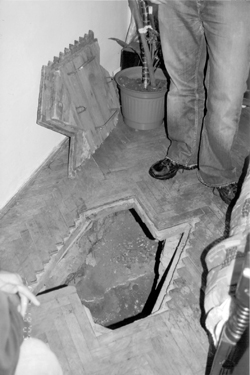
Mr Patrontasch's carefully crafted hatch in the floor, still there today
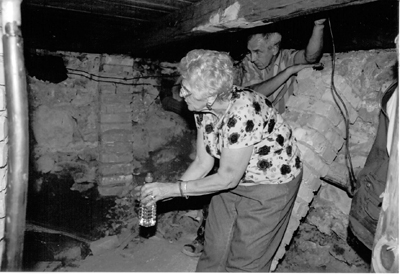
The bunker as it looked on our last trip
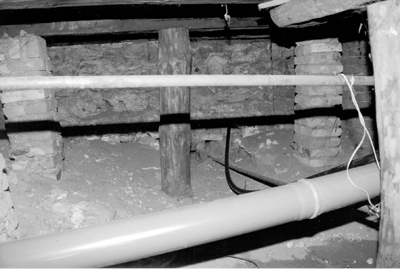
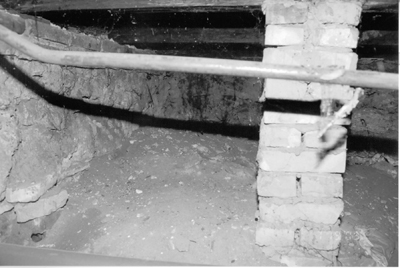
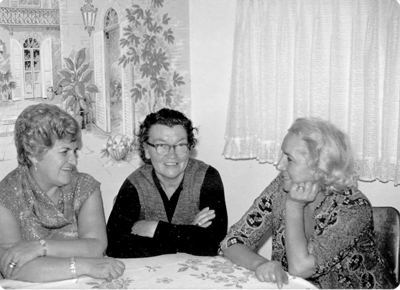
In Montreal with Ala and Lola, early 1970s
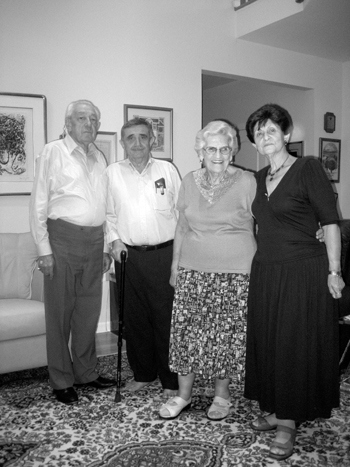
At home with Sol, Zygush and Zosia in 2007
Mr Patrontasch replied, âThank you for telling us. We knew there would be a reasonable explanation. You understandâ'
Beck interrupted him: âDon't give it another thought.' Then he went upstairs.
But his words did little to alleviate our fear. I trusted the Becks, but Mr Melman couldn't be convinced. I didn't know if Mr Melman's fears were real or influenced by the depression and despair that poured off us like sweat. We were all starting to disintegrate physically and mentally. Grey hair was trivial compared to Mr Melman's skin coming off like potato peel, the sores on Mama's breasts, teeth falling out, bleeding gums, rheumatism and the prickly heat that afflicted us like one of the ten plagues.
Almost every night we had guests until two or three in the morning and almost every afternoon we had a full house for lunch to listen to the radio. Beck had become very popular and all his Polish friends were asking his advice. As usual, the conversation turned to the killing of Jews. Hans the policeman said that he wished he were in Hungary because they were killing Jews there like they used to kill them here. He discussed murder as if it was a hobby, like skiing and searching for where the snow was the freshest. Soldier Hans conversed in some detail about his preferences for killing Jews and the various pleasures of the garrotte, gun and knife. Dieter chimed in that he could not kill an unarmed Jew, but would of course if they had a gun. Ala and Julia were serving food that the policemen brought home for them to prepare. Norbert said, âSometimes I think a bullet is too damn good for a Jew. Much better just to hack them to pieces.' I don't know how Julia and Ala didn't drop the trays of food. I was stunned to hear these words spring from Norbert's lips. I had earlier loved listening to him sing, but now his voice only brought forth images of a man hacking a Jew to death.
After Hans left, Norbert started prying. He asked Julia how long they had been living there. Julia blandly replied, âTwo years. Why?' âI don't know. I was lying on my bed, when I thought I heard rustling, like straw being moved around. And then I swore I heard two glasses being clinked together under my feet. And I'd heard of Jews hiding in bunkers dug underneath houses with plenty of food.'
Julia laughed it off. âTwo years and I've never heard a thing.'
Hopefully that would be enough to convince him. If he suspected something he would tell Hans the policeman. I marvelled how the Becks could keep up their charade night after night, day after day. One misstep, one inadvertent word, one sour or shocked expression and we were all dead.
Â
Julia left for Lvov to find some tobacco to sell. While she was gone, the ground started shaking and we heard the bombs exploding in Lvov. The electricity, which we had had for a few days, went off almost immediately. I began to pray that Julia hadn't been caught in the bombing. She came home in one piece, but couldn't come to the trapdoor to give us any food. Dieter was sick in bed and we spent the next two days sitting in the dark with no food and water. Poor Patrontasch. He started passing out from starvation. There wasn't even water to wet his lips. Papa whispered to Mama, âIf he dies we'll have to bury him down here.' I'd never heard Papa sound so cold about the health of a friend. There was nothing we could do about the lack of food. Compassion had become a luxury. If we had food we would give extra to Patrontasch, but there was no food.
What remained were the cold details of what we needed to do to survive. We couldn't empty the pails and the first trench was almost filled. The men would have to dig a new one as soon as we had light. The only place to put it was less than half a
metre from Lola's pallet. She didn't complain at all when Papa told her where they'd have to dig. We'd have to be quick about it. Norbert had told Julia that he could smell sewage and that he'd be happy to take a look at it for her.
Ala came home laughing and happy. She rushed to Beck to tell him that she was going, finally, to Krakow. Beck was thrilled. It was wonderful news for Ala and for us. If she was safe, Beck would be more likely to stay with us. Beck was also in a good mood because the news on the radio said the Russian front was moving closer to us; the Allies had taken Monte Cassino just south of Rome, and Lvov had suffered yet another bombing raid.
Overnight it got hot in the bunker. We were rank with sweat and most of us were fanning ourselves as fast as we could. We looked like the violin section of an orchestra playing an allegro movement. The trainmen and the soldiers were out, as was Mr Beck. Julia was alone upstairs and had opened the trapdoor to let in some air when there was a knock on the door. The knocking turned into pounding. Now the knocking was accompanied by repeated cries of âJUDEN, JUDEN', âWhere are the Jews?' Fresh sweat broke out on all of us. Julia and Patrontasch rushed to get the trapdoor closed, mirroring each other through the floorboards in their rushed frenzy. Zygush, who had been playing with his paper-and-wax dolls, stopped in mid-attack. Everyone stopped everything but breathing. Hands stayed in mid-air. Only Lola kept sewing like nothing was going on at all. My poor Mama fainted and again there was nothing we could do. Zosia grabbed a pillow and put it over her own mouth as she now did every time she became frightened. She started to cry, not loudly, but in persistent choking sobs. The Steckels grabbed their poison and fingered it nervously. Through my fear, I felt anger rushing through my veins. They always thought of themselves first. I hated them for doing this. Now that we had a gun,
and bullets since Klara had begged Beck for them, Artek picked it up. Who would Artek use the bullets on? On them or on us? I didn't even know how many bullets there were. I'd rather be killed by Artek than be dragged out through the streets and tortured. But there was no time to tell anyone that now.
The Ukrainian police swarmed into the house, screaming. I don't know how many there were, but their boots shook dirt off the bunker walls. They were tearing through the rooms. I heard closets slammed open. I heard their fists banging everywhere looking for false walls; furniture moved looking for trapdoors. Several sets of footsteps descended into the cellar, where wood was kept. It was next to our bunker but we had never opened up a doorway into it. It seemed like there were thousands of them. All the time they were screaming at Julia: âWhere are they? Tell us and we won't kill you. You Polish bitch. Everybody knows they're here. We know how many! You've got 14 Jews! The whole town knows it!' I thought they would start beating her. I was afraid Julia would give us away, or worse, that they would kill her. But Julia was holding her own, screaming back, âThere are no Jews here! We have Nazis living here!'
A familiar voice joined the screaming. It was our anti-Semitic soldier Hans, yelling at the top of his huge lungs: âSWINE! How do you dare search where German soldiers are living?'
The Ukrainian shouted, âThey're here! We have reports!'
Hans must have taken out his gun. âYou blue-coat, thieving sons of bitches, search, search all you want because there's no one here! But if I find one thing missing, I'll track you down and shoot you where you stand.' Caught up in his own arrogance, Hans had no idea how close he was to his own death. The Ukrainians were bloodthirsty. If they could get away with killing Hans, they would have done it in a minute.
âYou'll see. What do you Germans know? Fucking Polacks lie every time they take a breath and they'll fuck your mother if you turn around. There's a bunker here and one in the Jew bastards' factory. And a tunnel that leads from one to the other.'
We had in fact wanted to build such a tunnel. But who could have possibly told the Ukrainians? The only ones we thought knew about that bunker were the ones in this room and a few close friends and family, most of whom were dead. We all looked at each other and wondered. Nobody had seen Beck's nephew Wladek for weeks. There was talk of him staying with us to avoid being drafted by the Nazis, who considered him a deserter when he didn't show up for his induction. He was in and out of the house hiding from the Gestapo and had known about us since that first Christmas Day. He was a nice boy, but we knew he wasn't strong enough to withstand an interrogation. But if it had been Wladek, the police would have been at the hatch in ten steps from the front door.
Hans followed the Ukrainians to the factory, where they found the first bunker we had built but never really used. It was empty and they came back to the house. Lola didn't miss a stitch the entire time. I think her calm infected us all. She continued sewing as if no one was there and her thread and needle and socks were the only things in the world. Patrontasch picked up his book and started calculating and recalculating how many minutes we had been in the bunker.
I kept on thinking about who had given us away. If I could unravel this mystery, maybe this nightmare would end. Could it have been that children playing in the factory might have found the bunker? Just yesterday, Mr Beck had told us that there were roaming bands of children hunting Jews. One of the boys had seen a suspicious opening in a wall: a crack through which a shaft of light or a breath of air might penetrate. The boys had
called the police and had watched while they poured gasoline on the wall. As the fire spread, a group of Jews had emerged from a hidden doorway on fire. The Nazis hadn't wasted their bullets on them. They had watched them burn to death.
Finally, the Ukrainians left. Hans cursed their mothers in the crudest way possible. He told Julia to let him know if they came back again. He and the others would take care of them. I could feel the fury in his voice and I knew he wanted to kill someone. If it couldn't be Jews, then Ukrainians would have to do.
Hans had only come back to pick up something he had forgotten. Again, fate had intervened on our behalf. I didn't know what to make of it. We had cheated our deaths so many times. How many more times would we be saved? I felt like fate was taunting us. We sat in stunned silence as Hans left the house, whistling the tune he had picked up from Beck. Our secret code, âAll's Well That End's Well'. We would have to change our code.
Beck came home shortly thereafter. Julia hadn't even come to check on us yet. He must have been told about the search. Together with Julia they came down to the bunker. Even Julia came down. I thought they were going to tell us that this had been the last straw, that they would be leaving us. But they didn't say one reproachful word. Instead, they tried to calm us down and brought us bread. After all they had just gone through, they remembered to bring us bread. Sometimes, my mind did funny things. I whispered: âMama, if someone is bored with life, they could come and live with us. There's always plenty of excitement here.'
I thought back to our first Christmas here. If the Becks had known then what their future would hold, I could not imagine they or anyone else would have agreed to help us. Their spirit had been bent, but never broken. I thought of their tradition of setting an extra place for an uninvited guest at their beautiful
Christmas table. Not only did they have one extra. They had 18. When I was a child in our backyard watching Julia beat our rugs, I had no idea how strong her faith was. I didn't know if it gave her courage to save us or if it gave her the strength to resist her fear. What I witnessed every day in her was the remarkable sight of a woman doing what the saints and her saviour did without hesitation and without compromise. I knew that Julia would find her reward in heaven. I hoped she would also find it on this earth.
Â
We were still in shock from the search, but the Becks were going ahead with a party for their 22nd wedding anniversary. I don't know how they managed to celebrate anything in these dismal times, but it was a relief to hear something else through the floorboards. The soldiers hadn't left the house for a day and now they were helping with the preparations.
The house filled up with guests. The music was loud and the floor pounded above our heads from the dancing. Beck sang several love songs to Julia, each receiving monstrous applause. Even Von Pappen showed up as a surprise guest and toasted Beck as a proud and loyal
Volksdeutscher
. To listen to the party, you would think there wasn't a war going on outside the doors of the house, in which the guests were playing leading roles.
The party lasted until three in the morning. Only then did the house become quiet. The soldiers and the trainmen left for work and Beck soon came down to the bunker. Something in his appearance startled me. I didn't know why I hadn't noticed it before, but he had aged almost as much as we had. His hair had turned grey and his face was drawn and had the haggard look of a lost soul. The soldiers had been living with us for five weeks now. I didn't know if it was their arrival that had aged Beck. He was in a dark mood.
Then Beck did something to convince me that he just wanted it to end, like any of the Jews that ran to the wire. Mr Steckel had given him 20 gold Austrian crowns to sell. Mr Steckel had calculated that it would allow the Becks to spend seven zloty a day, which he deemed enough to feed each of us for a month. I didn't know what had precipitated the pharmacist's change of heart nor what he had based his calculations on. Seven zloty wasn't enough to feed a pet dog given the skyrocketing prices of bread. But I was grateful nonetheless. Perhaps it was the sight of Patrontasch fainting and the children with the malnourished bodies and faces of the old weathered crones in the Grimm Brothers' fairy tale of our basement that caused him to develop a conscience after 12 months with us. Or perhaps he thought it was safer for him to keep us alive rather than have to deal with burying corpse after corpse down here.
Beck sold the crowns to the commandant of the Ukrainian militia, the very man who had practically torn down the house looking for us. Trading gold was punishable by death. The commandant could have shot Beck on the spot and then taken the house apart, board by board and brick by brick. It was common knowledge that Jews used to deal in Austrian crowns before the war. But Beck had his own strategy. âDon't worry. Zavalinsky told me he would melt the gold for a ring.' There was no arguing with Beck. âAre we alive or not alive? Has everything I've done to keep you alive worked or not worked?'
